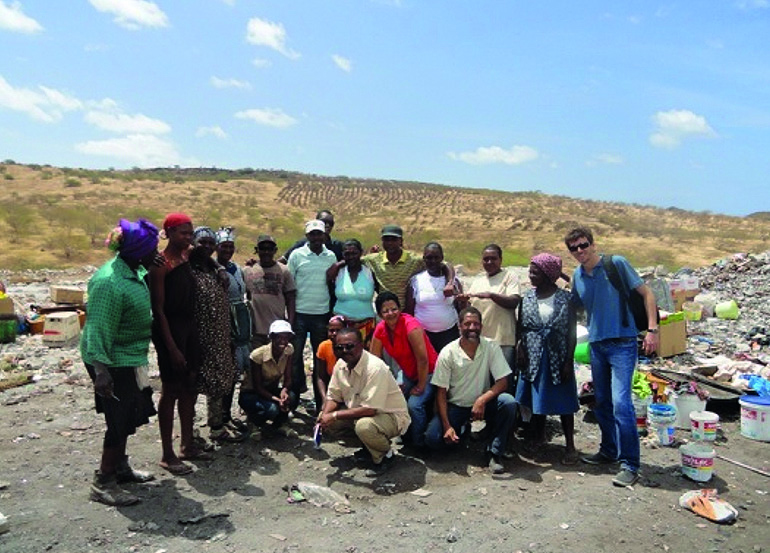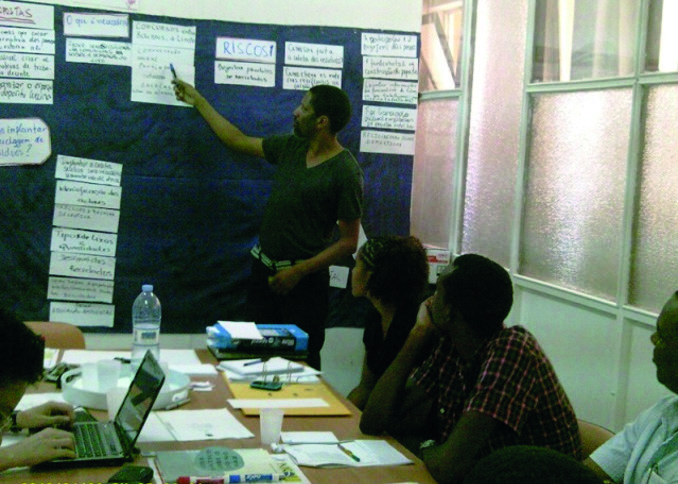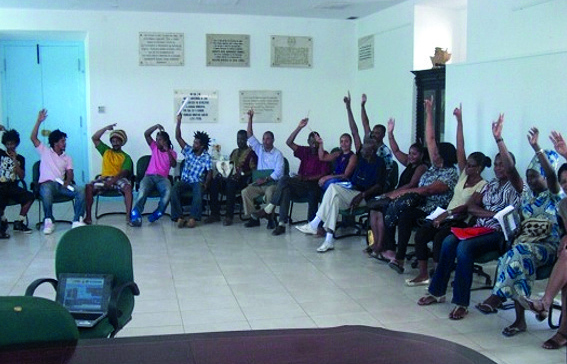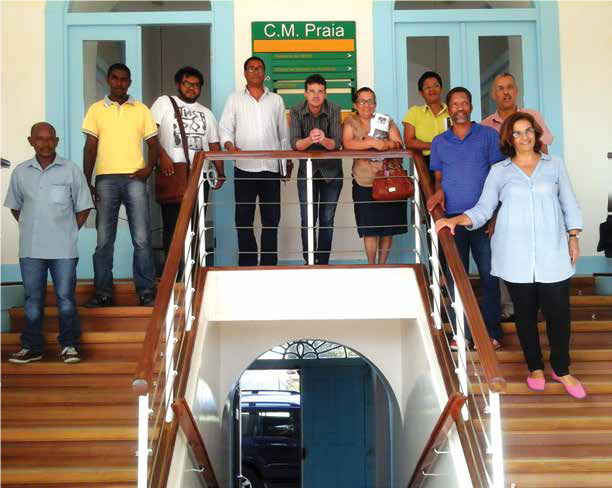 Promotion of Handicrafts and the Recycling of Garbage project
Fostering the professionalization of disadvantaged segments of the population in Praia, Cabo Verde, based on the principles of a solidarity economy and cooperativism
Promotion of Handicrafts and the Recycling of Garbage project
Fostering the professionalization of disadvantaged segments of the population in Praia, Cabo Verde, based on the principles of a solidarity economy and cooperativism

Challenges
The capital city of Cabo Verde, Praia, identified waste collection and recycling as two strategic and complex issues. Due to the absence of a properly implemented recycling chain, garbage is not being sorted, nor does it have a planned destination. Likewise, no decent livelihood alternatives are available for people living in dump areas in unhealthy and inhumane conditions, where they mainly collect food remains (for feeding pigs) and recyclable materials.
Local handicrafts constitute another underdeveloped sector in Cabo Verde. Praia does not have its own identity in artisanal products and a large portion of the items traded are imported. The handicraft sector can be an important source of preservation of local culture and history but needs better quality and added value, notably through using local raw materials. Development of the handicraft and waste-recycling sectors in a coherent, impactful and sustainable way required a specific study to define structures and activities needed.
Towards a Solution
Support to the Promotion of Handicrafts and the Recycling of Garbage was a South-South cooperation project implemented between 2011 and 2015 by the Municipality of Praia and the Central de Cooperativas e Empreendimentos Solidários (UNISOL), a Brazilian association established in 2005 to advance cooperativism and a solidarity economy. The project was supported by the Brazilian Cooperation Agency (ABC) and Cabo Verde’s Ministry of Foreign Affairs. The initiative aimed to elaborate a feasibility study for the handicraft and waste-recycling sectors in Praia, geared towards contributing to a development pattern that is both environmentally sustainable and socially fair. It focused on elaborating methodologies and structuring actions around four main axes: (1) mapping the productive chains in the target sectors; (2) assessing the application of social technologies; (3) identifying and fostering the participation of community leaders; and (4) supporting potential solidarity-economy groupings.
The elaboration of the study was based on exchanges between Brazil and Cabo Verde. A UNISOL team composed of representatives of the recycling and handicraft sectors visited Praia to establish contacts and gather information. A participatory diagnosis of the local craftspeople (about 50) was carried out, identifying their socioeconomic profile, their needs and their priorities. This activity resulted in the joint formulation of a draft project for the strengthening of the handicraft sector. Following a visit to Praia’s unplanned dumpsite, a diagnosis of the recycling chain’s potential was conducted together with the waste-pickers (80 people) to formulate solutions that could transform the prevailing situation. An assessment was made of the materials with recycling potential and of the products that could be manufactured and commercialized, together with an appraisal of the initiative’s required investment and expected financial return.
In turn, a Cabo Verdean delegation visited Brazil to gain first-hand knowledge on experiences of enterprises linked to UNISOL, such as handicraft and garbage-recycling cooperatives (including social projects with waste-pickers) and other local solidarity-economy initiatives. The Cabo Verdean representatives attended the National Handicraft Fair (FENEARTE), took part in meetings with artisans and visited a sanitary landfill and a factory in Osasco to observe an example of recyclable-material transformation.
The feasibility study, completed in 2015, delineated initiatives that could be implemented by the Municipality of Praia, together with the means and steps required to do so. The proposals included, among others, a marketing strategy for handicrafts involving Cabo Verde’s Ministry of Culture and the National Handicraft Forum (FONARTES) to enhance the sector’s sales and income generation. The establishment of a PET-bottle processing unit was also envisaged, involving the acquisition at fair prices of recyclable raw materials collected by the waste-pickers for the manufacturing of brooms and other products.
Contact Information
Countries involved
Supported by
Implementing Entities
Project Status
Project Period
Primary SDG
Secondary SDGs
Similar Solutions
| NAME OF SOLUTION | Countries | SDG | Project Status | |
|---|---|---|---|---|
A-Card Initiative |
Brazil, Cabo Verde | 10 - Reduced Inequalities | Completed | View Details |
Accelerating Digital Transformation in All Ministries in Bangladesh Promoting the rapid design and implementation of plans to digitize all ministries and subordinate government institutions in Bangladesh |
Brazil, Cabo Verde | 10 - Reduced Inequalities | Ongoing | View Details |
Accessible Digital Textbooks Promoting inclusive education through Accessible Digital Textbooks |
Brazil, Cabo Verde | 10 - Reduced Inequalities | Completed | View Details |
Adaptation for Smallholder Agriculture Programme Establishing better working conditions for smallholder farmers through the use of good practices and new technologies |
Brazil, Cabo Verde | 08 - Decent Work and Economic Growth 11 - Sustainable Cities and Communities 13 - Climate Action 15 - Life on Land | Ongoing | View Details |
ADAPT PLAN in Malawi |
Brazil, Cabo Verde | 01 - No Poverty 05 - Gender Equality 11 - Sustainable Cities and Communities | Ongoing | View Details |



